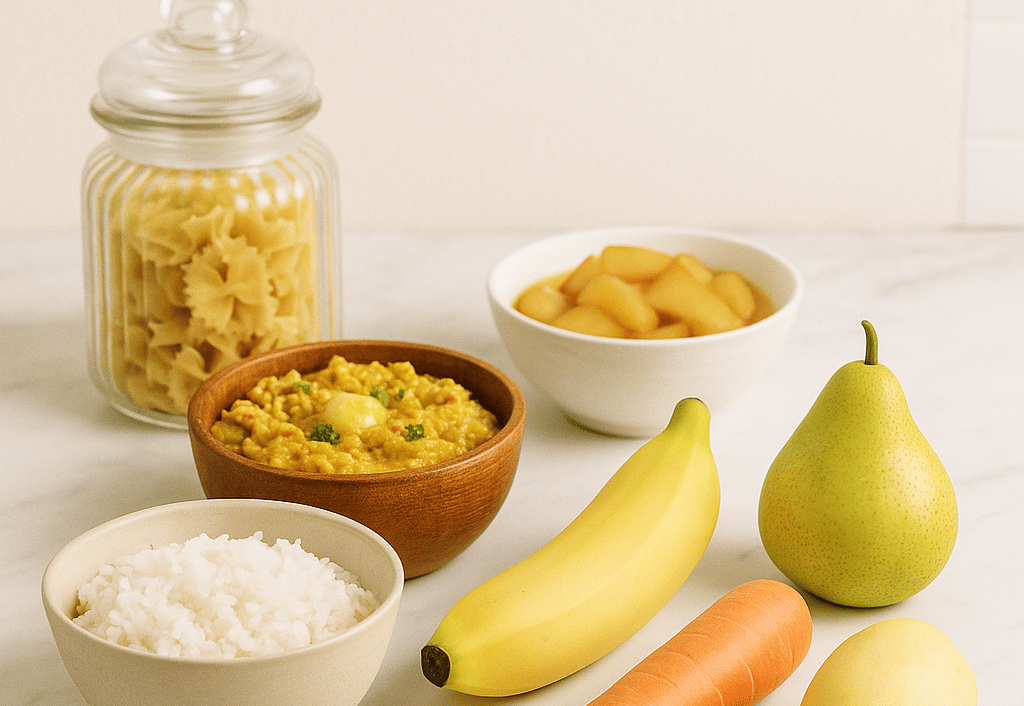5 Food Groups That Are Gentle on Digestion
Dr. RITAKSHI, MD, Clinical Nutritionist
7/31/20253 min read


5 Food Groups That Are Gentle on Your Gut
By Dr. Ritakshi Kumar, MD, Clinical Nutritionist
When Your Gut Needs a Break
Whether it's a bout of food poisoning, stress-induced indigestion, or a medical condition affecting your gastrointestinal system—what you eat can either soothe or strain your gut. During such times, switching to foods that are easier to digest can provide immense relief and support recovery.
As a clinical nutritionist, I often recommend gentle, gut-friendly meals to my clients when their digestion is compromised. These foods are typically low in fiber, low in fat, and easy to chew or swallow—allowing your system to rest and heal. These foods don’t demand much effort from your digestive system and can offer much-needed relief when you’re dealing with symptoms like bloating, nausea, or diarrhea.
Let’s break down five food groups that are typically easier to digest and why they may help when your stomach needs a rest.
1. Refined Grain Products (Think: White Rice and Toast)
While I usually encourage my clients to include whole grains in their diet, there are times when low-fiber options are more appropriate—especially during an active digestive flare-up.
Refined grains like white rice, white bread, or plain pasta have had their fiber-rich outer layers removed. That means they move through your GI tract with less effort, causing minimal irritation. This makes them helpful when you're dealing with indigestion, diarrhea, or recovery from illness.
✔️ My Tip: Opt for plain, minimally seasoned versions. A bowl of soft khichdi or toast with a thin layer of ghee can be soothing and easy to digest.
2. Soft, Peeled, or Cooked Fruits
Fruits are an essential part of any balanced diet, but when your gut is sensitive, you may need to make a few tweaks.
High-fiber fruits like apples with skin, guavas, or berries can be too rough on the digestive lining. Instead, opt for softer, low-fiber fruits like ripe bananas, papayas, or melons. Cooking or stewing fruits (like stewed apples or pears) can further break down their fibers, making them gentler to digest.
✔️ My Tip: Choose canned fruits only if they're packed in water or their own juice—skip the syrupy ones that load you with extra sugar.
3. Well-Cooked Vegetables (Skip the Crunch—for Now)
Raw vegetables, though healthy, can be too tough to handle during a digestive upset. Cooking vegetables helps soften the fiber, reduce the workload on your gut, and improve nutrient absorption.
Vegetables like zucchini (with seeds removed), carrots, spinach, peeled potatoes, beets, and green beans are all good options—just be sure they’re well-cooked until soft.
✔️ My Tip: Steam, boil, or stew your veggies. Avoid raw salads, stir-fried crunch, or anything with skin or seeds until your digestion improves.
4. Lean and Soft Proteins
Proteins are crucial for healing and repair, but not all protein sources are equally easy on your stomach. Fatty cuts of meat or heavily spiced preparations can be difficult to digest.
Instead, focus on softer and leaner protein options. Scrambled eggs, boiled chicken, soft tofu, or smooth nut butters are often better tolerated. Even lentils and dals—if well-cooked and strained—can work well for many.
✔️ My Tip: Stick to smaller portions, lightly seasoned, and avoid frying. Think comforting moong dal with a dash of cumin.
5. Blended or Liquid Meals (Soups, Smoothies & Purees)
Sometimes, it's not just what you eat, but how you prepare it. Blending, stewing, or pureeing foods doesn’t change their nutritional value much, but it can make them easier for your gut to process.
Soups made with soft vegetables and light broth, smoothies with ripe fruits and dairy-free options, or even mashed khichdi with ghee can be both nourishing and easy on digestion.
✔️ My Tip: Warm, blended meals work best when you're nauseated or recovering from illness. Keep the ingredients simple and mild.
So, Who Should Prioritize Easy-to-Digest Foods?
You might benefit from a gentler diet if you're recovering from gastrointestinal issues like:
Gastroenteritis (food poisoning or stomach flu)
Diarrhea or nausea
Acid reflux (GERD)
Gastritis or ulcers
Post-abdominal surgery recovery
IBD or IBS flares
Conditions like gastroparesis
In these scenarios, even healthy foods like whole nuts, raw veggies, or spicy dishes can worsen symptoms. Temporarily switching to milder, easier-to-digest options can give your gut the break it needs to recover.
A Gentle Reminder
While it’s okay to focus on easily digestible foods for short periods, don’t stay on a restricted diet long-term without professional guidance. Eliminating food groups for too long can lead to nutrient deficiencies and even disrupt your gut microbiome.
If your symptoms persist or keep returning, it’s important to work with a gastroenterologist to understand the root cause. And if you need help crafting a well-balanced, gut-friendly meal plan, I’m always here to support you with practical, personalized advice.
Your gut has its own rhythm—sometimes it just needs a little quiet to find it again. Give it that rest, and it’ll thank you.
— Dr. Ritakshi Kumar
Clinical Nutritionist | Medical Doctor
